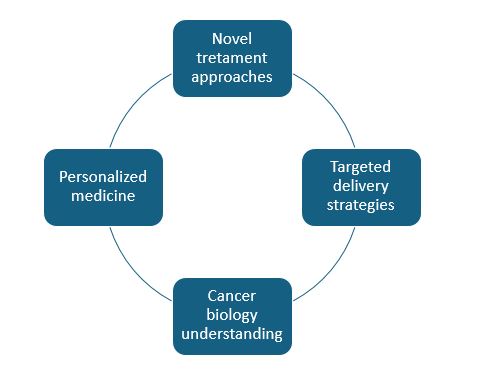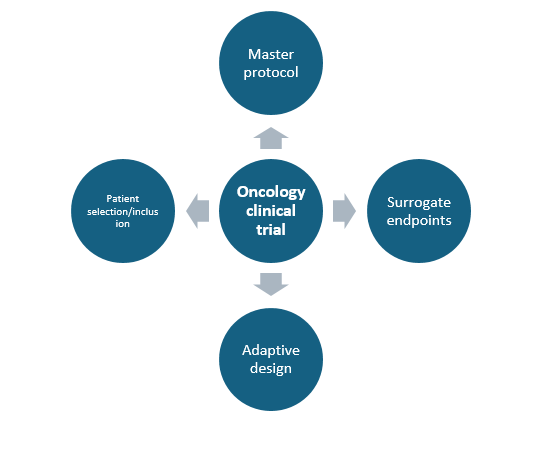According to the National Cancer Institute (NCI), a solid tumour is a mass of tissue that usually does not contain cysts or liquid areas such as sarcomas (arising from connective tissue), lymphoma (arising from the lymphatic system), and carcinomas (arising from epithelial tissue). Of solid tumour cancers, breast cancer is the most common in women (32.8%) and lung cancer is the most common type in men (13.1%) and are a leading cause of death globally. In addition to mortality, cancer-related complications place a considerable economic burden on patients and payers making it necessary to develop suitable treatments for cancer in a timely manner. Like other diseases, clinical trials form an important role in the development of efficacious and safe therapies/treatments for cancer and help deepen the understanding in the field of cancer biology, treatment, and patient care.
Unlike other conditions, cancers are relatively hard to manage effectively because of various factors such as tumour heterogeneity and resistance, side effects and toxicity, diagnosis issues, and access to care and costs. Thus, it is important to design and conduct clinical trials that can address these challenges to help advance the field of oncology.
Although cancer immunotherapy has emerged and is developing as an alternative treatment to surgical resection, radiation, chemotherapy for cancer which are nonspecific approaches and are cytotoxic are still commonly used. Immunotherapy approaches focus on stimulating the body’s immune system to fight off cancerous cells while leaving healthy cells intact. Some examples include monoclonal antibodies (mAb), immune checkpoint inhibitors (ICI), chimeric antigen receptor T-cell therapy (CART-T), cancer vaccines, and immune modulators.
There are a host of problems associated with the use of immunotherapy for targeting solid tumours such as immunosuppressive tumour microenvironment (TME) wherein hypoxia, pH, and immunosuppressive cytokines and suppressor cells, and high intra-tumoral pressure limit the penetration and effectiveness of cell therapy products. Antigenic diversity in different parts of the tumour can make it difficult for the use of a single antigen to eliminate all tumour cells and inefficient trafficking of immune cells to solid tumour sites due to abnormal tumour vasculature and extracellular matrix stiffness are also other challenges in the treatment of solid tumour cancers. Furthermore, late-stage diagnosis of solid tumours and limited accessibility to novel treatments due to factors such as accessibility and cost continue to plague the treatment of solid tumours.
Clinical trials using novel and combination immunotherapeutic approaches are being widely studied and are emerging in the management and treatment of solid tumour cancers. Novel drug delivery strategies such as liposomes, nanoparticles, quantum dots, and implantable scaffolds allow for the targeted and optimal delivery of therapies in the tumour minimizing side effects. Thus, it is expected that clinical trials for drugs and delivery systems that target solid tumours will help advance the understanding and development of targeted approaches for their management.
The figure below shows the various areas in which clinical trials can assist in forwarding treatment approaches for solid tumour cancers:
Novel treatment approaches
Various approaches that selectively target cancer cells have been developed for the treatment of solid tumour cancers with the objective of reducing systemic toxicity and improving the quality of life of patients by minimizing damage to normal, healthy cells. Ligand or receptor-based targeting, triggered release, intracellular drug targeting, gene therapy, cancer stem cell therapy, magnetic drug targeting, and ultrasound-mediated drug delivery are all based on selectively recognizing and targeting malignant cells and their use as investigational products in clinical trials will help them to gain regulatory approval for the treatment of cancers without deleterious side effects. Testing of combination approaches in trials is also expected to optimize cancer treatment.
Targeted delivery strategies
In addition to the type of immunotherapy agents that are tested in clinical trials, the type of delivery strategy which includes nanoparticles, liposomes, and targeted vaccines are also important in solid tumour cancer trials. These approaches are again designed to deliver the drug to the malignant cells with minimal toxicity to non-cancerous cells. Understanding their pharmacokinetics and release profile and correlation of these factors to therapeutic profile is expected to improve our understanding of cancer response and aids in the fine tuning of these delivery systems to maximize benefit to patients.
Cancer biology understanding
Understanding the impact of treatments and delivery systems on patients’ response drives researchers to gain an in-depth understanding of cancer growth and progression and molecular pathways and pathogenesis of various cancer types. This knowledge will help in the design of effective treatments and possibly diagnostic and prevention strategies in the future.
Personalized medicine
Precision medicine approaches are gaining popularity in the treatment of cancers and is based on observing an individual’s response to treatment based on their genetic make-up. Clinical trials using these methods can help identify biomarkers that include genetic mutations, gene expression patterns, and protein levels associated with tumours that help identify patients who are most likely to respond favourably to a particular treatment with minimal side effects.
Along with all the above mentioned ways in trials can help advance knowledge and treatment of solid cancers, the information gained from trials can help design trials that can benefit future patients and provide treatment approaches to patients that are nonresponsive to current cancer treatments thereby reducing the global health burden from cancers and improving patient care and quality of life.
Read More: Designing Effective Oncology Clinical Trial Protocols
References
1) Definition of solid tumor – NCI Dictionary of Cancer Terms – NCI
3) NOVEL DELIVERY APPROACHES FOR CANCER THERAPEUTICS – PMC (nih.gov)
4) Assessing the Future of Solid Tumor Immunotherapy – PubMed (nih.gov)








